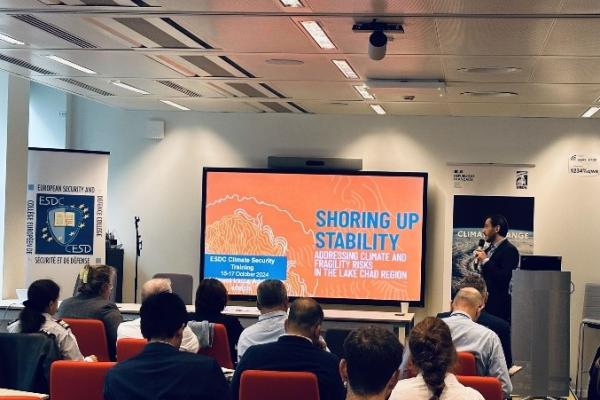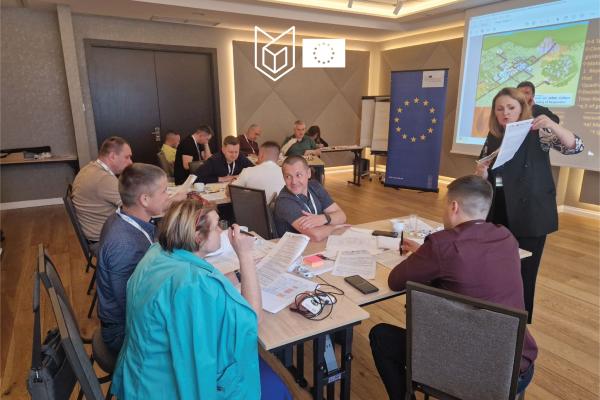About the configuration
The Climate Change, Environment, Security and Defence (CCESD) configuration was launched in December 2023 to consolidate climate security training efforts across the EU and its Member States through the EU Climate Security and Defence Training Platform (EU CSD TP) (ESDC/2023/322). It also provides a framework to address training gaps, strengthen institutional capacity, and promote synergies with stakeholders at multilateral, regional, and bilateral levels to tackle the nexus of climate change, environment, security, and defence.
Operating under the auspices of the European Security and Defence College (ESDC), the Initiative seeks to:
- Ensure quality and coherence of training, education, and related activities to address the climate change, environment and security nexus,
- Coordinate ESDC activities related to climate change, environment, security, and defence,
- Raise awareness and build the needed capacity and expertise through training and education in the field of climate change, environment, security and defence.
Governance, Membership and Organisation
The Climate Change, Environment, Security and Defence configuration (CCESD) operates through regular plenary sessions and currently 4 thematic sub-groups to implement a modular, needs-based training programme. As of April 2025, the platform brings together 21 training providers and 20 additional partners from government ministries, police forces, and civil society as well as the EU and International Organisations. Plenary and sub-group participation is open to all CCESD members. Additionally, members can grant observer status to non-members of the CCESD.

Chair and Configuration Support
- Chair Monika Psenner
Monika Psenner serves as the first Chairperson of the CCESD and is Head of Capacity Development at the Austrian Centre for Peace, where she provides strategic and operational oversight of the organisation's comprehensive training portfolio. She is also the founder and director of Aidvance.net, a social enterprise promoting ethical practices in international aid and development. With over 15 years at SOS Children’s Villages International, she has worked extensively with local associations across Africa.
Monika holds degrees in language studies and international business (University of Innsbruck), and a Master’s in International Affairs from the Fletcher School of Law and Diplomacy at Tufts University. She is also a trained crisis and contingency manager.  ESDC Coordinator Esther Breffka
ESDC Coordinator Esther BreffkaEsther Breffka is seconded from the Zentrum für Internationale Friedenseinsätze (ZIF) to the ESDC, where she serves as the ESDC’s Climate Security Coordinator. In this capacity, she develops and manages the CCESD, organises and leads related training courses, seminars, and conferences, and fosters partnerships in the field both within the EU and internationally. Esther holds a Bachelor’s in International Relations (TU Dresden) and a Global Master in Development Practice (Trinity College Dublin), both awarded with first-class honours. Her expertise includes human rights, sustainable development, gender, and law, with experience across Europe and Africa.
CCESD training programme
Level 1: Climate-Environment-Security Nexus
- E-Learning Lesson: The implications of Climate Change, Environmental Degradation and Exploitation on International Peace, Security, and Defence (elementary level);
- Course: The Implications of Climate Change, Environmental Degradation and Exploitation on International Peace, Security, and Defence (basic level); Climate Change & Disaster Risk Management (basic level)
Level 2: Focus areas as per Sub-Group
- Environmental crime
- Pilot (under development)
- Environmental management/performance
- Preparedness training for environmental advisors (pilot; expert course)
- Environmental management (under development)
- Environmental peacebuilding/CPS
- Hydrodiplomacy (under development)
- Climate-Energy-Defence Nexus
- Energy Security (basic level)
- Disaster Relief (basic level
Facts and figures
 20+courses since the start of the configuration
20+courses since the start of the configuration +600participants since 2018
+600participants since 2018 40%of participants were women
40%of participants were women
 57%civilian participants
57%civilian participants 23%military participants
23%military participants 8%participants working in law enforcement
8%participants working in law enforcement 12%participants from diplomatic services
12%participants from diplomatic services



